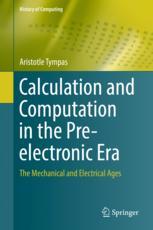

Most ebook files are in PDF format, so you can easily read them using various software such as Foxit Reader or directly on the Google Chrome browser.
Some ebook files are released by publishers in other formats such as .awz, .mobi, .epub, .fb2, etc. You may need to install specific software to read these formats on mobile/PC, such as Calibre.
Please read the tutorial at this link: https://ebookbell.com/faq
We offer FREE conversion to the popular formats you request; however, this may take some time. Therefore, right after payment, please email us, and we will try to provide the service as quickly as possible.
For some exceptional file formats or broken links (if any), please refrain from opening any disputes. Instead, email us first, and we will try to assist within a maximum of 6 hours.
EbookBell Team

4.3
68 reviewsAlthough it is popularly assumed that the history of computing before the second half of the 20th century was unimportant, in fact the Industrial Revolution was made possible and even sustained by a parallel revolution in computing technology. An examination and historiographical assessment of key developments helps to show how the era of modern electronic computing proceeded from a continual computing revolution that had arisen during the mechanical and the electrical ages.
This unique volume introduces the history of computing during the “first” (steam) and “second” (electricity) segments of the Industrial Revolution, revealing how this history was pivotal to the emergence of electronic computing and what many historians see as signifying a shift to a post-industrial society. It delves into critical developments before the electronic era, focusing on those of the mechanical era (from the emergence of the steam engine to that of the electric power network) and the electrical era (from the emergence of the electric power network to that of electronic computing). In so doing, it provides due attention to the demarcations between—and associated classifications of—artifacts for calculation during these respective eras. In turn, it emphasizes the history of comparisons between these artifacts.Topics and Features:
"In this fascinating, original work, Tympas indispensably intertwines the histories of analog and digital computing, showing them to be inseparable from the evolution of social and economic conditions. " Prof. David Mindell, MIT